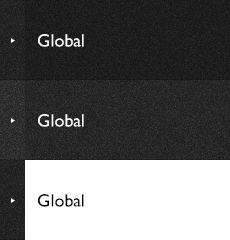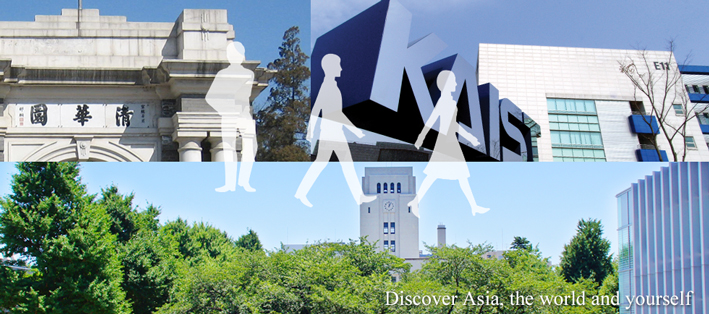
The first phase of the TKT CAMPUS Asia program was conducted from AY2011 through AY2015. The second phase, Advanced TKT CAMPUS Asia Consortium, is underway from AY2016 through AY2020.
Program outline
The TKT CAMPUS Asia program, one of the Re-Inventing Japan Projects funded by the Ministry of Education, Culture, Sports, Science and Technology (MEXT), is a joint educational and research exchange program.
In this program Tokyo Tech, Korea Advanced Institute of Science and Technology (KAIST) and China's Tsinghua University (Tsinghua), three world-class universities in the fields of science and technology in East Asia, promote international exchanges between their universities while cultivating globally oriented future leaders. The TKT CAMPUS Asia program offers students quality assured cooperative education and research opportunities.
Two Tokyo Tech students, a master's degree student and a doctoral degree student who studied at Tsinghua and KAIST respectively, report on their experiences in the program below.
Junpei Umetsu
1st-year master's student, Department of Biological Information, Graduate School of Bioscience and Biotechnology
Studied at Tsinghua University for one year
Why I chose the TKT CAMPUS Asia program and Tsinghua University
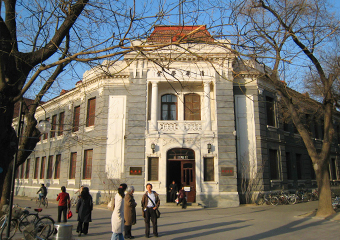
Tsinghua University
I chose Tsinghua University because I thought I would be able to conduct research and build a network of contacts in China that would be advantageous from a global perspective, as China is enjoying remarkable development and has a close relationship with Japan. When I was a 3rd-year undergraduate student, I visited Tsinghua University as part of the Research and Development for Bioscience and Biotechnology in Overseas Countries course. I saw that Tsinghua students were diligent, motivated to conduct research and proficient in English. I thought the program would allow me to appreciate another culture, but it also enhanced my research capabilities and improved my language skills.
My impression of Tsinghua University
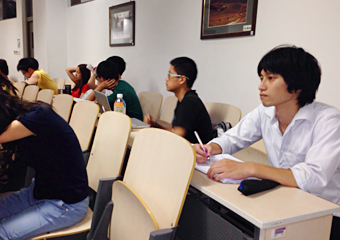
Umetsu in a class at Tsinghua University
Tsinghua University has an enormous campus and everything you need for campus life. Labs, lecture rooms, cafeterias, dormitories, supermarkets and bookshops can be found on campus. I had the impression that students and faculty members were much closer to each other than those at Japanese universities, probably because Tsinghua students spent most of their time on campus. I stayed on campus most of the time too and ate my meals with other students and faculty members.
Tsinghua students were so enthusiastic that sometimes they even interrupted faculty members during class. I was surprised when a student cut off a faculty member and stated his opinion for about three minutes in a class on life-science ethics.
My research topic at Tsinghua
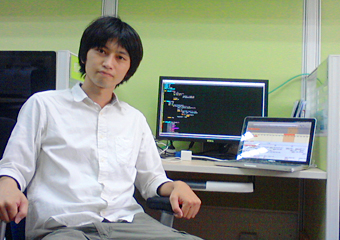
Umetsu in the lab
My research involved analyses of the binding sites of RNA1-binding proteins. I also created a database of their specifications. RNA-binding proteins have a significant impact on gene expression, the process by which information contained in a gene is used in the synthesis of proteins with various bio-functions. This research is conducted in a broad range of academic fields.
The experimental technique for analyzing protein interactions with RNA is called CLIP (cross-linking immunoprecipitation). In my research at Tsinghua University I identified the binding sites of RNA-binding proteins by means of putting together multiple databases of CLIP research results and making a comprehensive analysis. In addition, I compiled a database of the research results for future research on RNA-binding proteins.
1 RNA (ribonucleic acid) acts as a messenger carrying instructions from DNA and is made of a ribose sugar, a base and phosphoric acid for controlling the synthesis of proteins.
Future prospects
I am not going on to a doctoral degree. I hope to work at a company. I want to make the most of the data analysis skills I acquired doing research and the language proficiency and communication skills I gained from my study abroad experience.
Regardless of the future economic situation, China will continue to be Japan's neighbor. I will find many opportunities to put to use my experience whatever career choice I make.
Ryohei Kobayashi
2nd-year doctoral student, Department of Computer Science, Graduate School of Information science and Engineering
Studied at KAIST for four months
Why I chose the TKT CAMPUS Asia program and KAIST
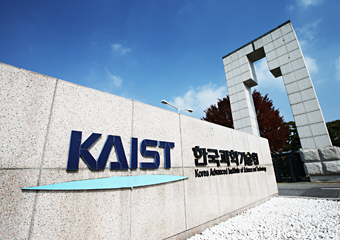
KAIST
Sometime around November when I was a 2nd-year master's student, my academic supervisor emailed me about an opportunity to study at KAIST on the TKT CAMPUS Asia program. At that time, I was ready to go to KAIST immediately if I could study under Associate Professor John Kim, the world-renowned scholar in my field of expertise. He is a regular speaker at prestigious conferences such as the International Symposium on Computer Architecture (ISCA) and the International Symposium on Microarchitecture (MICRO). I learned that the TKT CAMPUS Asia program also provides a scholarship and applied for the program straight away.
Classes at KAIST
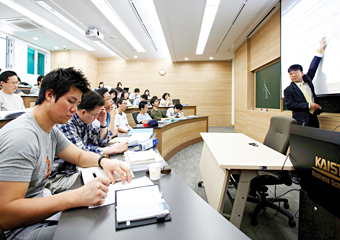
Lecture at KAIST
At KAIST most classes are conducted in English. During the four months of my stay, I took classes in English and conducted research.
At Tokyo Tech one course has one lecture a week, but at KAIST one course has two lectures a week, which gave me the impression that classes at KAIST went into greater depth than those at Tokyo Tech. In addition, classes progressed quickly. Associate Professor Kim's classes were particularly quick, required lots of knowledge and were intense for me. I gained a lot of confidence as I overcame various difficulties. I also attended seminar classes where invited companies or notable public figures come and give presentations on their technologies and research.
My research at KAIST
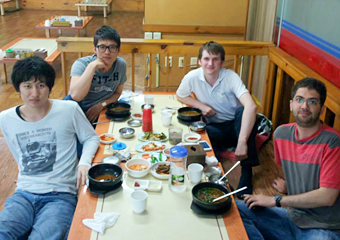
Kobayashi with lab members (front left)
Before going to KAIST, I consulted with my academic supervisor at Tokyo Tech and decided to choose a research topic which was different from my master's thesis. The topic I chose was the reliability assurance of routers which link cores in processors. I designed a stable mechanism for the routers and evaluated their reliability.
Before I went abroad I thought I would write my thesis on the advantages or beneficial applications to society of my research if they outnumbered the disadvantages. However at KAIST I saw a different way of pursuing research. Students discussed with their academic supervisors, conducted related research and thoroughly revised their research until the advantages of the research outweighed the disadvantages. My colleagues in the lab told me it took at least one year for students to get permission from their academic supervisors to start writing their theses. I learned that conducting thorough and exhaustive research without compromising can lead to presenting at prestigious conferences.
Future prospects
Based on my experiences at KAIST studying, discussing and conducting research in English, I am eager to take advantage of other international opportunities for studying abroad, participating in international conferences or doing international internships.
I hope to be a researcher in the future. After earning a doctoral degree I would like to have the opportunity to conduct research in a company for a while rather than staying on in a lab at Tokyo Tech. I have no idea where I will eventually end up, in academia or in industry. Either way, I will be happy if my research findings contribute to society's future wellbeing. It doesn't matter if it is in Japan or abroad. I am looking forward to future opportunities.
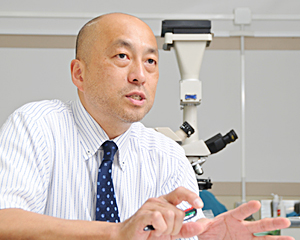
Professor Hara
Message from Professor Masahiko Hara, TKT CAMPUS Asia Project Leader
Some Asian countries, such as China and Korea, have shown remarkable growth in the recent past and have almost reached the growth levels of the U.S. and Europe which have been leading the world. Japan, with its high cultural standards and highly developed technologies has not made enough contributions to global society. Against this backdrop, exchanges of Japanese students with our neighbors, China and Korea, countries with whom we share cultural similarities, is a way to deepen our joint understanding and cooperative relationships. In this way we can further promote the development of our three counties and the development of the world. Finally, I expect study abroad to lead to more flexible thinking by exposing students to diverse ideas.
Outbound and inbound programs
Outbound students: Programs conducted at Tsinghua University and KAIST
Outbound students can either take courses in their fields of expertise while learning about the languages and cultures of China or Korea, or focus exclusively on research
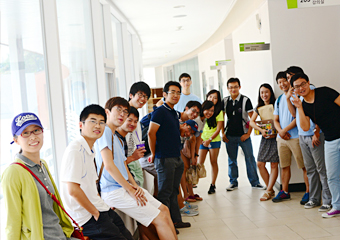
KAIST
Tsinghua University
- 1
- Coursework and research
(fall semester or spring semester)
- 2
- Research only
(more than three months)
KAIST
- 1
- Summer program for one month
(extendable)
- 2
- Coursework and research
(fall semester or spring semester)
- 3
- Winter break program
(more than one month)
For details, click here.
Inbound students: Programs conducted at Tokyo Tech
Inbound students have three programs to choose from at Tokyo Tech.
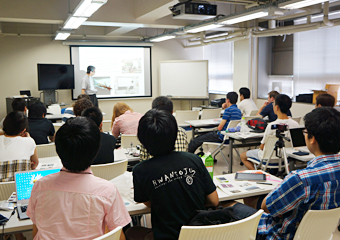
Summer School
- 1
- Summer Program
Undergraduate and master's students become members of a lab at Tokyo Tech, and participate in the Summer School while undertaking a short-term research project.
- 2
- Joint Educational Program
This is a research only program. Master's and doctoral students conduct research on a topic set by faculty members at Tokyo Tech and at their home universities, KAIST or Tsinghua, to earn a master's or doctoral degree. Tailored educational guidance is provided to each student by a faculty member at their home universities in cooperation with a Tokyo Tech faculty member.
- 3
- Summer and Joint Educational Combined Program
This is a program that combines the Summer Program and the Joint Educational Program. Students undertake a research project and participate in the Summer School. In the fall semester they can take credit-transferable courses.
For details, click here.
The Special Topics component of the Tokyo Tech Website shines a spotlight on recent developments in research and education, achievements of its community members, and special events and news from the Institute.
Past features can be viewed in the Special Topics Gallery.
Published: July 2014
. Any information published on this site will be valid in relation to Science Tokyo.













